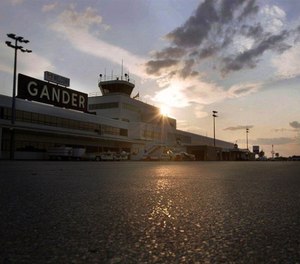
Sometimes we just have to make the best of a terrible situation
Recently, I attended a fantastic play, " Come From Away ," a Broadway musical depicting a true story about September 11, 2001. It tells the story of 38 planes and 7,000 passengers who were diverted to Gander, Newfoundland due to the terrorist attacks in New York City, Arlington, Virginia, and Shanksville, Pennsylvania.
The residents of Gander opened their arms to all the diverse cultures and confused people who landed in their town, not knowing what had happened far away. Gander individuals provided lodging, food, drink and comfort to many who thought the end of the world had arrived once they started watching the news on television. Some passengers didn’t even know what had happened to their family members in New York City and could not reach anyone by phone.
As these diverse cultures came together to make the best of a terrifying event, they became long-time friends and learned to accept each other, eliminating individual biases and conquering fear. There was no way that the small town of Gander could have prepared for such a day, but they met the crisis head on and succeeded in helping to make a terrible situation better.
Reflecting on this story, how are you preparing for federal grant changes in 2022?
Several changes have occurred. Grants.gov enhanced their security on February 21, 2022. To access this website, all users must link their Grants.gov account to Login.gov.
In addition, the Data Universal Numbering System (DUNS) is being replaced by the Unique Entity Identifier (UEI), assigned by the System for Award Management (SAM.gov). To find out more about this change, visit https://www.grants.gov/web/grants/forms/planned-uei-updates.html .
In January 2022, the Treasury published the final rule for the State and Local Coronavirus Fiscal Recovery Fund, part of the American Rescue Plan Act (ARPA), to provide more spending flexibility. A webinar recording about this ARPA final rule can be found here . $65.1 billion dollars were distributed to all United States counties. States, local governments, tribes, and non-entitlement units of local government (NEUs) must follow this guidance as of April 1, 2022. Some localities were waiting for this final rule before spending funds, while others already started spending the money.
Adam Roth from Amplifund summarizes the eligible spending changes as shown below.
What will you do to “Come From Away” in preparing for these changes? Make sure you follow the federal government’s guidance, reach out for help if needed, ensure ARPA Funds are spent appropriately, and ensure you are ready for any upcoming federal grants your organization is interested in pursuing. Don’t get left out in the dark without a lifeline (or a Gander).
Copyright © 2025 EducationGrantsHelp.com. All rights reserved.
